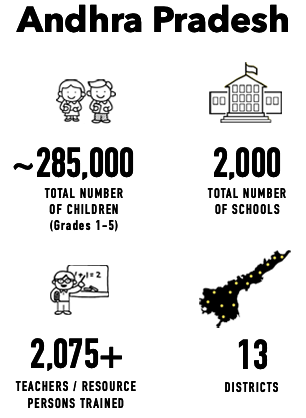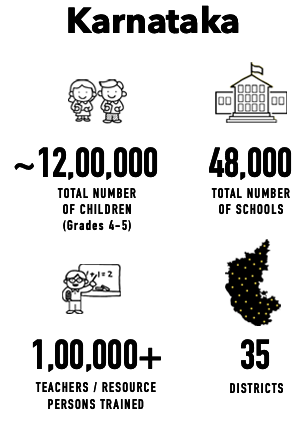Lack of sound Foundational Literacy and Numeracy (FLN) skills among the large number of school-going children in India has been a key cause for learning poverty which has, in turn, contributed to overall poverty levels.
Historically, India’s education spend and its policy focus has been primarily on access. A cultural factor working against numeracy is the definition of ‘literate’. This means that lack of language skills is seen as being shameful and a sign of backwardness, yet lack of numeracy is NOT.
Mathematics is widely believed to be a foundational discipline upon which a lot of future learning in school depends. Yet, achievement levels of students in primary school math are generally poor. Less than 22.7% of the children in class 5 can do simple division (ASER 2018) . Moreover all these surveys show that over time the number of proficient children is declining. This is a cause of worry and we need to improve on it significantly in a short period of time so as to be able to support our children in becoming productive members of society that is increasingly becoming knowledge-based.
Ganitha Kalika Andolana (GKA) is a multi-stakeholder initiative for improving the mathematics learning outcomes of India’s government school system. Since 2015, it has been taught to children from grades 1 to 5 based on the philosophy of ‘Activity Based Learning’ (ABL). It is a robust and effective model that engages multiple stakeholders to facilitate learning inside classrooms and at home.
GKA has benefitted over 7 million children studying in Government Primary schools in Karnataka, Odisha, and Andhra Pradesh till date.
The Numeracy at Scale Study cites Akshara Foundation's flagship - Ganitha Kalika Andolana (GKA), as one of six successful programmes from across the world to have improved early grade numeracy outcomes at scale.
Scaling up any initiative needs a successful combination of public commitment, backed with financial investment. And of the list, Government buy-in in the form of a Government Order is absolutely essential.
GKA follows a strong methodology and curriculum that we have created along with teaching / learning materials (National Curriculum Framework). Click here to download our free math resources.
Training and field support for teachers, state and district Resource Persons (RPs) in the Education Department is done in a cascade format, as part of GKA’s Capacity Building exercise.
Innovative and efficient monitoring tools and processes are essential to support roll-out at scale. Like our mobile-based app that works online and offline, allowing access from remote places
This forms the demand side of GKA. The greater the demand for quality learning from the community, the more sustainable it will be in the long run. Collecting inputs from parents, community members, SDMC members, elected reps, etc. has been a large part of our effort and this is now being captured via an Android-based app (available on PlayStore) called ILP Konnect . Click here for survey results.
The GP Contests are community-driven assessments of children in a non-intrusive environment. They serve as a platform to keep a tab on children’s learning curve and make necessary course corrections to improve the learning process for children. Click here to see how a Gram Panchayat math contest unfolds.
Creating a learning environment at home was key to balance all the work being done to ensure quality learning in the classroom. The Building Blocks app does just that. All the child needs is a parent’s smartphone (entry-level) and he/she can practice the math learnt in school, as a fun game, in the home. Click here to download the app.
GKA Programme Coverage





